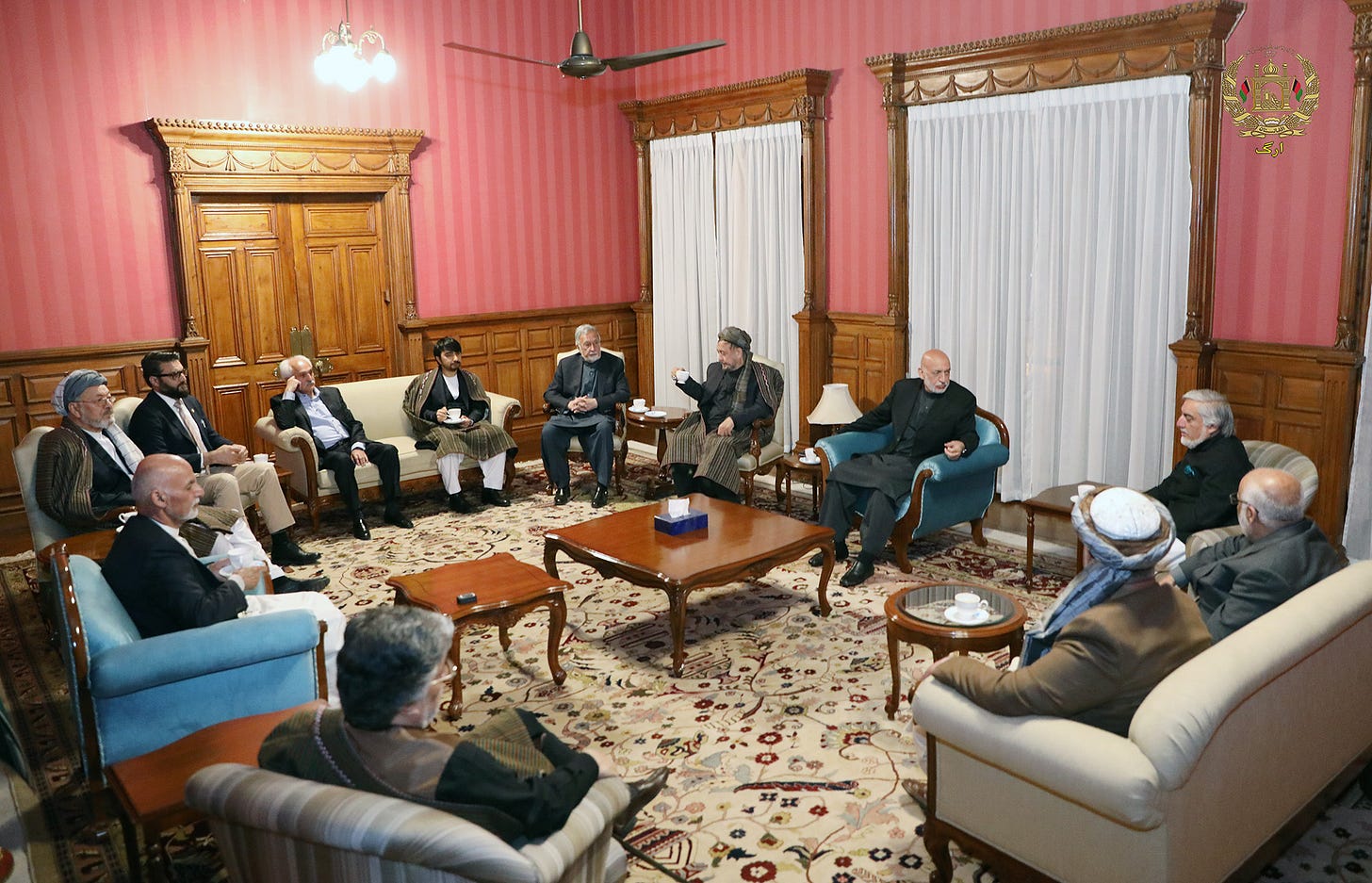Taliban’s all-male cabinet isn’t a surprise; the world’s sudden concern for gender representation is, and other stories
#WomenLead (Issue 66): Your weekly round-up on women in politics
Hello, and welcome to Issue 66!
We are dipping our toes right in because we have a lot to say in this edition. This week, we bring you updates from Lebanon and Japan, readings from India, Latin America and Uganda and the spotlight is on all of us today - not just any nation - and about our rather selective outrage when it comes to women’s representation in politics. In case you missed last week’s edition, you can read it here.
If you find our work worthwhile and would like to support this initiative, please upgrade to a paid subscription of the newsletter. It will only strengthen our work and help us stay sustainable. Thank you!
Quick Updates
🛑 A MATTER OF GREAT CONCERN: Lebanon finally has a government after more than a year of political deadlock. It includes just one woman among the 24 ministers - Najla Riachi - who will be the Administrative Development Minister. Not only is this an abysmal situation, it is also a steep decline - women made up 30 percent of the previous government’s cabinet.
UN Women issued a statement saying this was “of great concern”. “This mirrors the strikingly low level of women’s representation across political and public office in the country, with women currently occupying less than five percent of parliamentary seats and making up less than six percent municipal councillors”, the organization noted.
👩🚒 WILL SHE WIN? In Japan, Prime Minister Yoshihide Suga has decided to step down and the country is headed to find the next person to lead it. Will it be another man (as it has always been so far)? Sanae Takaichi, an ally of former PM Shinzo Abe, has thrown herself into the fight, and if she wins, she could script history. But will it be easy? Hardly! Yuriko Koike, the Governor of Tokyo, had once remarked that women needed to break “an iron plate” and not a glass ceiling when it came to Japanese politics. Last year, when two women wanted to run but were unable to get support from enough of their party colleagues to even register as candidates.
Spotlight: GLOBAL 🌐🌐🌐
Earlier this week, the Taliban finally announced its government in Afghanistan. Nothing to be excited or surprised about: none of the 11 ministers are women, and some are familiar names on “most wanted” or “terrorist” lists.
At #WomenLead, we have been reading the news headlines from across the world about the new Afghan government with a strange sense of curiosity. The world suddenly seems to have discovered a special love for gender representation - so many headlines are pointing out the lack of women in the Taliban’s cabinet.
Seems like this development has shaken up the world! (Trust us, we are relieved to see such proactiveness on the representation front).
But let’s dig deeper. What’s so unique about Afghanistan that this fact is suddenly causing so much lament for everyone from India to the US to Europe to Australia?
Did you know that at the beginning of this year,
12 countries did not have a single woman in their national cabinet?
23 countries had only one woman in their cabinet?
Afghanistan had just two women ministers in the ousted cabinet?
Three countries did not have a single woman in their Parliament, and four others just had one?
The country that boasts of using foreign policy to save women across the world was just about to inaugurate its first female vice president after nearly 250 years of democracy?
(Data source: Inter-Parliamentary Union/UN Women)
The contrast between the general indifference to women’s representation in politics and this exceptional focus on the same topic when it comes to Afghanistan is noteworthy, isn’t it?

To us, this is not surprising.
We were fooling ourselves if we thought gender equality in Afghanistan was of concern to the US and its buddies. Women were their defence, their justification, their tool to push forward geopolitical interests (as they often are in colonial and imperialist projects). That narrative fed to us for two decades now makes it difficult for news headlines to look at Afghanistan without the focus on the country’s women.
In many ways, that’s a great thing: every development not just in Afghanistan but in the world must indeed be viewed with a gender lens. But for nations led mostly by men, gender equality isn’t such a high-stakes commitment; it is simply a weapon in their armour of realpolitik.
If the West (or the entire world now suddenly concerned about an all-male cabinet) cared so much about women’s representation in politics:
Why did the US not do more to ensure that the gains made by Afghan women were safeguarded even as they left? As the US withdrew troops, it took just days for Afghanistan to slip from having 27 percent quotas for women in Parliament to pretty much a 100 percent quota for men. A peace deal was signed, but this clearly was not part of it.

How many women were part of the peace discussions? If Afghan women mattered so much, why was there just one woman in the discussions as of March this year? When that woman questioned this, she was told: “You talk so much as the sole woman in the room; imagine what would have happened should there have been more women.” (!!!)
 Only one woman @SarabiHabiba was allowed to be in the room where a nation's future is decided. No man left the meeting as a sign of protest or criticised in any other way. No solidarity with women. Misogyny in its peak.@SarabiHabiba in her remarks to the room full of men: “why I should be the only woman in the room? We have not been part of the war, we can certainly contribute to peace. 51% of pple should not be ignored. Hope hosts take note of it for the future.” https://t.co/imd1FY3CjR
Only one woman @SarabiHabiba was allowed to be in the room where a nation's future is decided. No man left the meeting as a sign of protest or criticised in any other way. No solidarity with women. Misogyny in its peak.@SarabiHabiba in her remarks to the room full of men: “why I should be the only woman in the room? We have not been part of the war, we can certainly contribute to peace. 51% of pple should not be ignored. Hope hosts take note of it for the future.” https://t.co/imd1FY3CjR Nader Nadery @N_Nadery
Nader Nadery @N_NaderyBy the way, the Taliban wasn’t the only party that showed up with an all-male team on that negotiation table. None of those who came to save Afghan women did enough to show the Taliban that it was an exception and that it should be ashamed of itself. (There is ample evidence to suggest that including women in such processes only strengthens peace deals, but this was not done.)
Fawzia Koofi was on point when she told Arab News:
If you look at our allies, in Moscow, actually there was no woman from those countries that are our friends and our supporters of peace … it is an international phenomenon to undermine, ignore and deny women participation in such a process like peace and security.
“I think regional countries need to engage and involve more women to set an example for the Taliban that it is ok to include women…
“Unfortunately, the approach has always been tokenistic,” she added.
Were the men on any side listening to her?
We have even more questions:
How do countries go on maintaining wonderful relationships with allies where women are missing from ministerial positions, or are denied other rights? Dear America, we are talking of Saudi Arabia.
Lastly, how does the crème de la crème of the “free world” - the G7 and G20 - go year after year clicking group pictures with barely a woman or two among them?

Spot ‘em women. G20 Summit, 2019. Image via Twitter/@JPN_PMO
Look, let’s be clear - the Taliban deserve no sympathy for their brazen disregard for women’s rights. But it’s easy to spot those wolves because they are not wearing any sheep’s clothing. Other countries, currently riding on a moral high looking at Afghanistan, could do well to use this moment for some self-reflection.
Also read: The Other Afghan Women, The New Yorker
Take India, for example. The Indian media’s love for representation in Afghanistan is less laughable and more infuriating because even in 2021, we have states that have ZERO women elected to their assemblies, something that often goes unacknowledged (forget critiqued).
And India isn’t alone. Women’s representation is often worse at state/sub-national levels, and those governments often get away with lesser scrutiny.
Governments with enough women are still the exception, not the norm. The fact that zero women in the cabinet bothers us but two women (in the ousted Afghan government) didn’t raise eyebrows only means we are comfortable with women being used as tokens.
Today’s newsletter is no defence of what is happening in Afghanistan. We are absolutely angry and heartbroken at what Afghan women are facing. But as our regular readers know, countries that are concerned about representation today have no great record of treating their own women politicians well. Much of the media (which might just have been delighted if the Taliban had fielded one token woman minister) fails to report on women ministers sensitively and respectfully.
If we really, truly care about women’s representation and rights, our job cannot start and end at just the Taliban. We’ve also got to clean up our own backyards, hold our own leaders accountable, push back attempts at normalizing misogynistic politics, and most of all, stop being content with tokenism. If zero women is problematic, so is one woman, and so are two women. We deserve more. We definitely deserve better.
Reflections & Reads
Today (September 12) marks 25 years since India first introduced the Women’s Reservation Bill to mandate one-third seats for women in the national and state legislatures. In this piece for Al Jazeera, Anuja looks at the journey of the bill that has still not seen the light of the day. And ICYMI, a few days ago, we looked at how the current government has been dodging questions about the same for the past 7 years.
How have quotas for women fared on the other side of the world - in Latin America? In this piece for Bloomberg, Maria Eloisa Capurro argues that they haven’t been able to do enough to boost women in the region’s politics.
On a related note, Beatrice Lamwaka reports that quotas in Uganda’s politics have failed to “even out the distribution of parliamentary power, instead pitting women against one another for a limited number of “second-class” seats.
That’s a wrap for this week! If you liked reading this issue, press the like ❤️ button, and forward this to a friend/colleague or share it on your social media - reader endorsement is the only way newsletters grow!
A big thank you to every one who has upgraded to a paid subscription. Every week, we put together this newsletter with a lot of love and hard work. Your payments have only strengthened our resolve. If you would like to support out work, please upgrade to a paid subscription plan. Thank you! We’ll see you next weekend with Issue 67!



